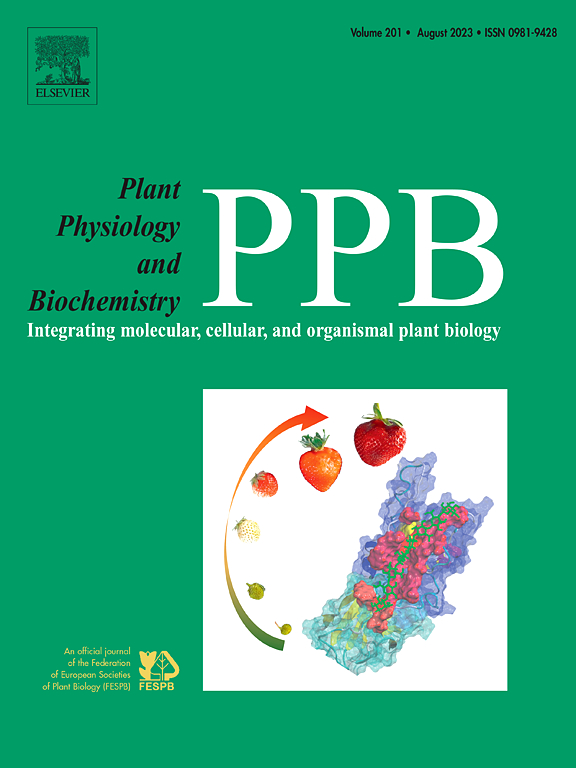硅通过提高黄瓜的排钠能力和抗氧化能力来提高盐胁迫下黄瓜根系钾潴留
IF 5.7
2区 生物学
Q1 PLANT SCIENCES
引用次数: 0
摘要
盐胁迫导致钾(K+)的渗漏和缺乏,从而限制了植物的生长。钾离子泄漏量的减少(又称钾离子滞留量)在植物耐盐性中起着关键作用。硅(Si)可以缓解盐胁迫,促进植物K+营养状态,但其机制尚不清楚。本研究探讨了硅对黄瓜根系K+保持的调控作用及其机制。结果表明,盐胁迫导致黄瓜生长抑制、Na+积累和K+缺乏,而Si降低Na+含量,促进K+含量,从而促进盐胁迫下的Na+/K+稳态和黄瓜生长。此外,硅改善了盐和模拟氧化应激引起的K+泄漏,这一结果得到了选择性离子电解质技术(SIET)的进一步证实。同时,硅提高了盐胁迫下黄瓜根系抗氧化酶活性、总抗氧化能力以及抗氧化系统相关基因的表达。此外,Si处理增强了盐胁迫下根对Na+的排斥,这可能与SOS和NHX基因的表达上调有关。综上所述,Si可以通过促进根系对Na+的排斥和抗氧化能力来增强黄瓜根系对K+的保留,从而缓解盐胁迫。本文章由计算机程序翻译,如有差异,请以英文原文为准。
Silicon enhances root potassium retention in cucumber under salt stress through promoting sodium exclusion and antioxidant capacity
Salt stress induces potassium (K+) leakage and deficiency, thereby limiting plant growth. The decrement of K+ leakage (also called K+ retention) plays a key role in plant salt tolerance. Silicon (Si) can alleviate salt stress and promote K+ nutrition status in plants, however the mechanisms behind remain unclear. In this study, the regulatory effects and related mechanisms of Si on root K+ retention in cucumber were investigated. The results showed that salt stress induced significant growth inhibition, Na+ accumulation and K+ deficiency in cucumber, while Si decreased Na+ content and promoted K+ content, thereby promoting Na+/K+ homeostasis and cucumber growth under salt stress. Moreover, Si ameliorated the K+ leakage induced by both salt and simulated oxidative stress, which was further confirmed by the results of selective ion electrolyte technique (SIET). Meanwhile, Si enhanced antioxidant enzyme activity, total antioxidant capacity, and the expression of genes related to antioxidant system in cucumber root under salt stress. In addition, Si treatment enhanced root Na+ exclusion under salt stress, which could be based on the upregulated expression of SOS and NHX genes. Overall, our results show that Si can enhance root K+ retention in cucumber by promoting root Na+ exclusion and antioxidant capacity, thereby alleviating salt stress.
求助全文
通过发布文献求助,成功后即可免费获取论文全文。
去求助
来源期刊
CiteScore
11.10
自引率
3.10%
发文量
410
审稿时长
33 days
期刊介绍:
Plant Physiology and Biochemistry publishes original theoretical, experimental and technical contributions in the various fields of plant physiology (biochemistry, physiology, structure, genetics, plant-microbe interactions, etc.) at diverse levels of integration (molecular, subcellular, cellular, organ, whole plant, environmental). Opinions expressed in the journal are the sole responsibility of the authors and publication does not imply the editors'' agreement.
Manuscripts describing molecular-genetic and/or gene expression data that are not integrated with biochemical analysis and/or actual measurements of plant physiological processes are not suitable for PPB. Also "Omics" studies (transcriptomics, proteomics, metabolomics, etc.) reporting descriptive analysis without an element of functional validation assays, will not be considered. Similarly, applied agronomic or phytochemical studies that generate no new, fundamental insights in plant physiological and/or biochemical processes are not suitable for publication in PPB.
Plant Physiology and Biochemistry publishes several types of articles: Reviews, Papers and Short Papers. Articles for Reviews are either invited by the editor or proposed by the authors for the editor''s prior agreement. Reviews should not exceed 40 typewritten pages and Short Papers no more than approximately 8 typewritten pages. The fundamental character of Plant Physiology and Biochemistry remains that of a journal for original results.

 求助内容:
求助内容: 应助结果提醒方式:
应助结果提醒方式:


